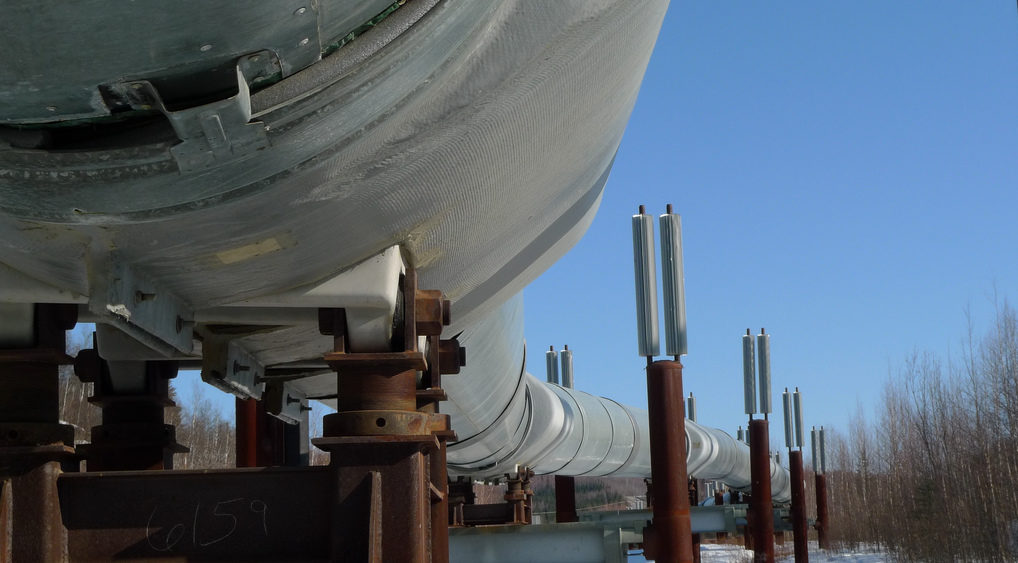Global markets are in a steep week-and-half long slide, with major US indices plummeting during some of the worst sell-offs in history. Fossil fuel companies felt the greatest financial pain when two shocks hit almost simultaneously: worldwide fears of the coronavirus leading to reduced consumer demand and a price war between major oil-producing countries. It is too early to say what any of this will mean for the Northwest’s fossil fuel industry, but it could usher accelerated decline.
It’s unlike anything in history, according to oil industry expert Daniel Yergin. “There’s just so much weakness,” he said. “It’s a problem of an oil price war in the middle of a constricting market and the walls are closing in.”
Investors are fleeing the Northwest’s oil refinery owners and selling off their stakes in gas pipeline companies. To understand just how much trouble these fossil fuel companies are in, we can examine how prices—for their stock and their products—have declined since the trouble started at the beginning of 2020.
BP, the biggest oil company in the region, fared best among Northwest refiners, but it has still lost 50 percent of its value since the beginning of the year. Meanwhile, Shell and Marathon are down 57 percent each, and Phillips 66 has lost a staggering 71 percent of its value since the opening bell on January 1. US Oil, the smallest refiner, is owned by Par Pacific Holdings, which has seen its share price drop 70 percent in 2020. Meanwhile, nearby Targa Resources, which stores and transports a range of petroleum products from its Tacoma terminal, has seen its stock price decline by 76 percent in the nearly three months of 2020 so far.
The situation may be even worse for the biggest public-sector player in oil: Canada. When the Canadian government bought the Trans Mountain Pipeline and its expansion plans in 2018 at the behest of Prime Minister Justin Trudeau, some analysts warned that taxpayers were being fleeced by the Texas tycoons who unloaded it for Can$4.5 billion. The project’s price tag has since ballooned threefold to Can$12.6 billion. The picture got much darker with the collapse of oil prices. Benchmark prices for Western Canadian oil have cratered, falling from more than $43 at the end of 2019 to less than $19 as of this writing. Few oil operations in Western Canada can make a profit at those prices because it costs more to extract, process, and transport the sludge-like tar sands. Fossil fuel industry analysts estimate that new tar sands developments will not be profitable unless oil prices are sustained at $60 or $70 or more.
The oil fracking industry that supplies the Northwest with a large share of its oil faces similar challenges. The Bakken Shale companies are the source of almost all the oil trains seen in the Northwest, but that industry is on exceedingly shaky ground, as it has become a high-cost producer in a low-cost world, as the Houston Chronicle recently wrote. An energy analyst quoted in a recent article summed up the situation well: “We will see a lot of defaults and Chapter 11 bankruptcies. That will be inevitable at $30 a barrel. It’s going to be tough times.” (Right now, US oil prices in Texas are well below $30.)
The gas industry is also getting hammered. Williams, the region’s dominant gas pipeline company, has watched its value tumble by 43 percent in 2020. It’s the same story for Pembina, the Canadian fracked gas corporation behind the Jordan Cove LNG export project in Coos Bay, Oregon. The company’s swooning share price—down 56 percent—will not help the project, which was already troubled by an Oregon state agency permit denial and sinking LNG prices. Reference prices for LNG have dipped everywhere in the world, including by more than 40 percent in Asia, where Pembina had hoped to sell its fuel for a profit.
Petrochemicals are in the same boat. Sustained low oil prices could threaten the financial viability of projects like the gas-to-methanol proposal in Kalama, Washington, because low prices may motivate oil companies to shift toward the more profitable petrochemicals market to compete with fracked gas as a feedstock. Indeed, the primary competitor for gas-to-methanol is the oil derivative naphtha, and naphtha prices have been halved over the past eight weeks.
It’s difficult to predict what the economic downturn means for the region’s fossil fuel industry, the carbon export plans for its shores, or for the Northwest’s opposition movement, the Thin Green Line. News media reports that the Trump Administration will try to shore up the airline industry or the shale oil and gas industry with public money, though neither strategy may actually work. Others speculate that the new global response will yield big reductions in greenhouse gas emissions, at least in the short term. Still, despite all the turbulence and uncertainty, it is likely that the industry will be permanently smaller, weakened both by forces years in the making as well as those unforeseen.
Note: Most prices for stocks and commodities cited in this piece were current as of the close of the New York Stock Exchange on March 16, 2020.
Thanks to John Abbotts, who contributed valuable research assistance for this article.

 Stay Informed
Stay Informed